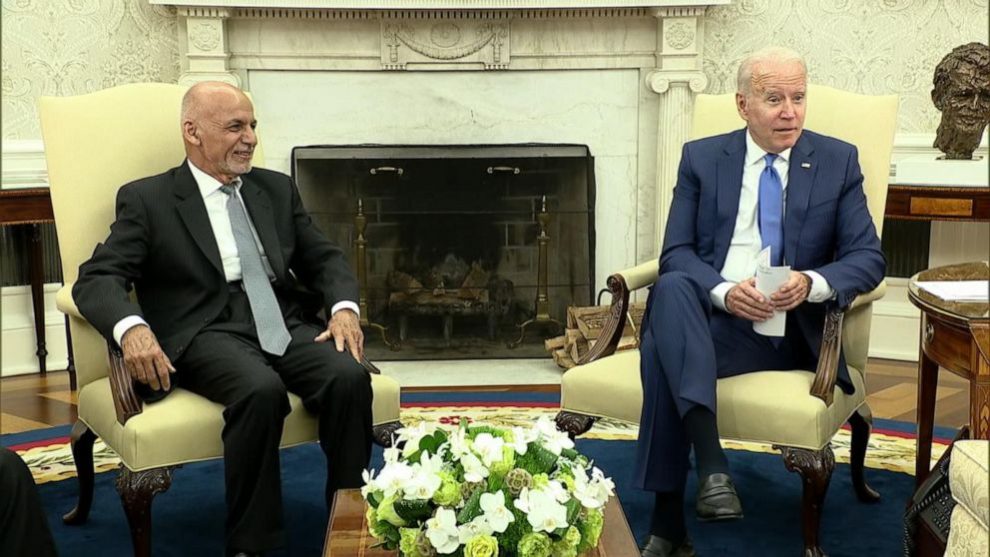President Joe Biden said the American military mission in Afghanistan will conclude by Aug. 31, arguing that the U.S. achieved its goals and should not seek to rebuild the nation.
“I want to be clear: the U.S. military mission in Afghanistan continues through the end of August,” Biden said in a speech at the White House on Thursday. He said the U.S. would continue “to speak out for the rights of women and girls” even as the Taliban makes quick gains amid the American drawdown.
Biden reflected on America’s longest war, which will end just shy of its 20-year anniversary after the deaths of 2,448 U.S. service members and nearly 21,000 wounded. He said the U.S. invasion had succeeded at bringing to justice Osama bin Laden, the perpetrator of the Sept. 11, 2001, terrorist attacks, but that “there’s no mission accomplished” — an allusion to former President George W. Bush’s premature declaration of victory in the Iraq War.
“I will not send another generation of Americans to war in Afghanistan with no reasonable expectation of achieving a different outcome,” Biden said. “The United States cannot afford to remain tethered to policies created in response to the world as it was 20 years ago.”
Biden said the U.S. would continue to provide civilian and humanitarian aid and help the Afghan defense forces maintain their air force. But, he added, countries in the region should “step up their efforts.”
He insisted it is not inevitable that the Taliban will retake control of the country, pointing out that the Afghan government has a far larger and technologically superior military.
“They have the capacity, they have the forces, they have the equipment,” he said. “The question is: will they do it.”
But he added that the country is “highly unlikely” to be ruled by a single, “unified” government.
“The only way there’s going to be peace and security in Afghanistan is if they work out a modus vivendi with the Taliban, and they make a judgment as to how they can make peace,” he said.
Biden and Vice President Kamala Harris were briefed earlier Thursday on the progress of the troop withdrawal. The president said that his military advisers had recommended pulling out forces swiftly, once he announced the decision. He said that as a result, there had so far been no U.S. casualties since the announcement.
Public Support
The U.S. withdrawal was applauded by Biden’s Democratic allies and is supported — if more quietly — by some Republicans as well. Still, disagreements have arisen over the timing and pace of withdrawal, and the White House has taken criticism over whether it was sufficiently in control of the drawdown as it has unfolded.
About 62% of Americans approved of Biden’s plan to withdraw, according to a Quinnipiac University poll published in May, and Biden’s predecessor, President Donald Trump, also sought to end the U.S. military’s deployment in Afghanistan.
Jane Horton, whose husband, Army Specialist Christopher Horton, 26, was killed Sept. 9, 2011, in Afghanistan’s Paktika province, said in an email that “my heart is in a million pieces” after Biden’s announcement.
Horton, a vocal advocate for families of service members killed in the nation’s wars, described mixed feelings about the withdrawal.
“The war will end for us,” she said, but “it will continue on for the Afghan people. While I am grateful that no more Americans will be in harm’s way, I struggle to comprehend what my husband’s legacy will be.”
Senator Lindsey Graham, a South Carolina Republican and a strong supporter of the Iraq and Afghanistan wars, said Biden’s plan is “a disaster in the making” that would lead to a resurgence of the al Qaeda and Islamic State terrorist groups.
Relocating Afghans
Administration officials had previously discussed temporarily relocating about 9,000 Afghans who could be at high risk for helping U.S. forces to three Central Asian nations for processing. Biden said that so far, the U.S. had approved 2,500 Special Immigrant Visas for Afghans who have aided American forces, but that less than half of those eligible have exercised their right to do so. Relocation flights are set to begin this month, Biden said.
The president originally pledged to withdraw U.S. combat troops entirely from the country by September, save for a contingent to protect American diplomats, a timeline that the Pentagon recently said would be completed by late August.
But the U.S. withdrawal — after nearly $1 trillion in spending — has only underscored the continuing turmoil in a country referred to as the “graveyard of empires.” With the U.S. pullout underway, tens of thousands of Afghan families are fleeing regions in the country’s north to escape the advance of Taliban militants who are clashing with Afghan security forces.
“It’s a 20-year war that has not been won militarily,” White House Press Secretary Jen Psaki said earlier Thursday.
As the U.S. handed over Bagram Air Base, its biggest facility, to President Ashraf Ghani’s government last week, the Taliban managed to take over most of Kunduz province and are now pushing toward the capital, Kunduz city. The insurgent group known for its harsh treatment of women and adherence to a strict form of Islam controls about half of Afghanistan’s 400 districts, 130 of which it’s taken since April.
The Afghanistan Ministry of Defense said this week it’s developing a plan to retake fallen regions. Despite Biden’s confidence, many military and regional experts believe a Taliban takeover is inevitable.
Story cited here.























